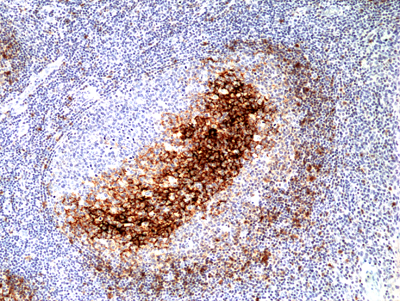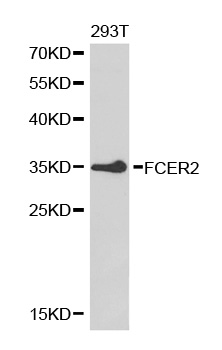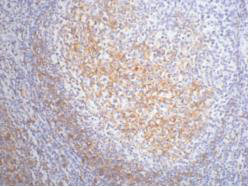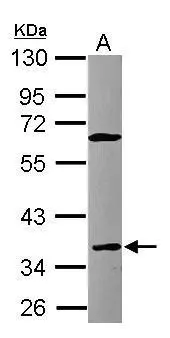
Immunohistochemical staining of formalin fixed and paraffin embedded human colon cancer tissue section using Anti-MSH3 Rabbit Monoclonal Antibody (Clone RM405) at a 1:200 dilution.
anti-CD23 (human), Rabbit Monoclonal (RM406)
REV-31-1292-00
ApplicationsWestern Blot, ImmunoHistoChemistry
Product group Antibodies
ReactivityHuman
TargetFCER2
Overview
- SupplierRevMAb Biosciences
- Product Nameanti-CD23 (human), Rabbit Monoclonal (RM406)
- Delivery Days Customer2
- ApplicationsWestern Blot, ImmunoHistoChemistry
- CertificationResearch Use Only
- ClonalityMonoclonal
- Clone IDRM406
- Gene ID2208
- Target nameFCER2
- Target descriptionFc epsilon receptor II
- Target synonymsBLAST-2, CD23, CD23A, CLEC4J, FCE2, FCErII, IGEBF, low affinity immunoglobulin epsilon Fc receptor, C-type lectin domain family 4, member J, CD23 antigen, Fc fragment of IgE receptor II, Fc fragment of IgE, low affinity II, receptor for (CD23), FcepsilonRII, fc-epsilon-RII, immunoglobulin E-binding factor, immunoglobulin epsilon-chain, lymphocyte IgE receptor
- HostRabbit
- IsotypeIgG
- Protein IDP06734
- Protein NameLow affinity immunoglobulin epsilon Fc receptor
- Scientific DescriptionCD23 (Fc epsilon RII; FcepsilonRII) is a glycoprotein present on a subpopulation of freshly isolated peripheral blood and tonsil B cells and strongly expressed on EBV-transformed B lymphoblasts. The CD23 molecule is a low-affinity receptor for IgE, an antibody isotype involved in allergy and resistance to parasites, found on B cells. It is expressed on mature B cells, activated macrophages, eosinophils, follicular dendritic cells, and platelets. Expression of CD23 has been detected in neoplastic cells from cases of B cell chronic lymphocyctic leukaemia and some cases of centroblastic/centrocytic lymphoma. Functionally, CD23 is involved in B cell growth and differentiation and IgE production. CD23 is known to have a role of transportation in antibody feedback regulation. CD23 has a soluble form that is a potent mitogenic factor. Diseases associated with CD23 dysfunction include chronic conjunctivitis and chronic lymphocytic leukemia. - Recombinant Antibody. This antibody reacts to human to CD23. Applications: WB, IHC. Source: Rabbit. Liquid. 50% Glycerol/PBS with 1% BSA and 0.09% sodium azide. CD23 (Fc epsilon RII; FcepsilonRII) is a glycoprotein present on a subpopulation of freshly isolated peripheral blood and tonsil B cells and strongly expressed on EBV-transformed B lymphoblasts. The CD23 molecule is a low-affinity receptor for IgE, an antibody isotype involved in allergy and resistance to parasites, found on B cells. It is expressed on mature B cells, activated macrophages, eosinophils, follicular dendritic cells, and platelets. Expression of CD23 has been detected in neoplastic cells from cases of B cell chronic lymphocyctic leukaemia and some cases of centroblastic/centrocytic lymphoma. Functionally, CD23 is involved in B cell growth and differentiation and IgE production. CD23 is known to have a role of transportation in antibody feedback regulation. CD23 has a soluble form that is a potent mitogenic factor. Diseases associated with CD23 dysfunction include chronic conjunctivitis and chronic lymphocytic leukemia.
- ReactivityHuman
- Storage Instruction-20°C,2°C to 8°C
- UNSPSC41116161







